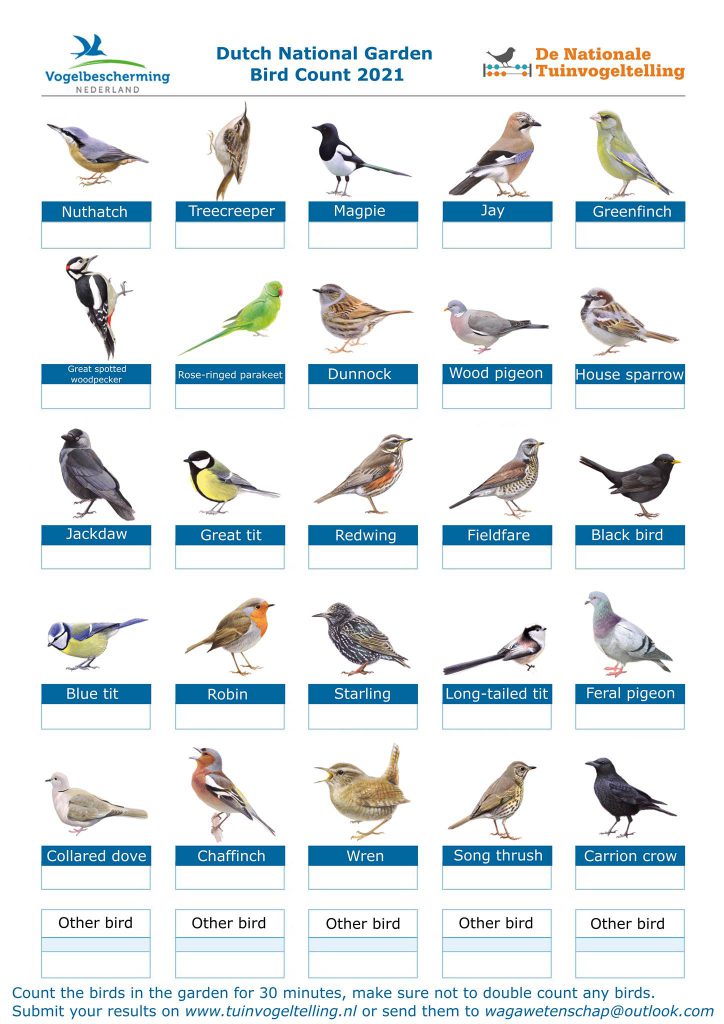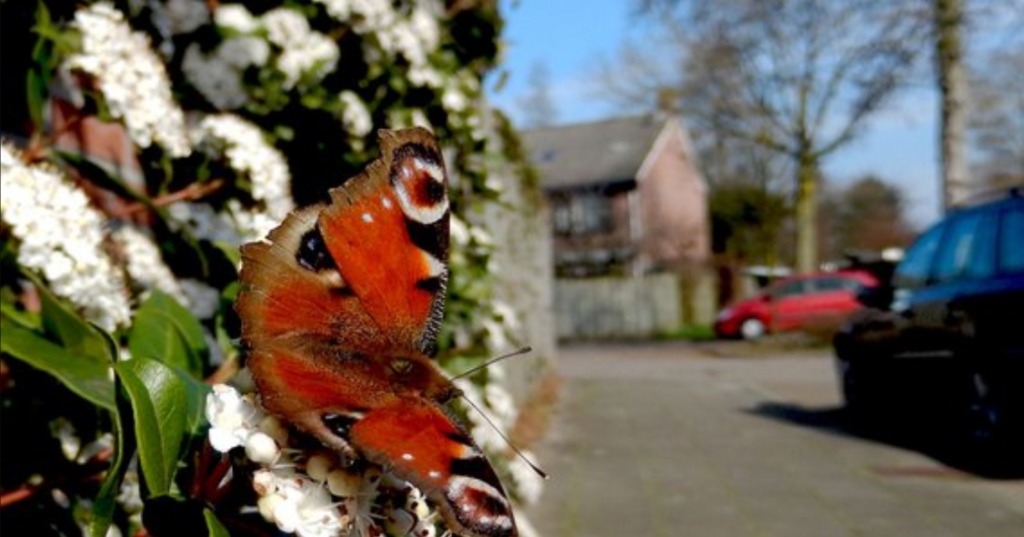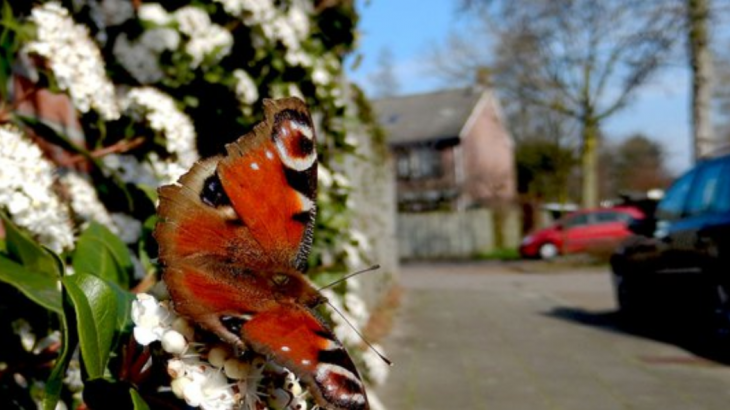Getting your hands dirty:
A compilation of biodiversity projects you can contribute to
The year of corona gave most of us something in common: an overwhelmingly large amount of screen time. Whether your eyes are starting to feel it or you just feel the need to get fresh air, offline, outdoor activities seem to be in short supply in the current academic environment. With the sun starting to shine and the weather starting to warm, spending the day sitting inside can be particularly difficult. The Green Office blog teamed up with the Future for Nature Academy to come up with a selection of biodiversity related projects that you can directly contribute to in Wageningen (and in most cases, also elsewhere in the Netherlands), to support your local scientific community, support the promotion or monitoring biodiversity, or support yourself, by giving you a good reason to go outside. The list below is extensive but likely not exhaustive – it is always smart to research your local conservation or nature organizations if you want more ideas. Note: these projects do not necessarily involve getting your hands dirty, the author of this post was simply struggling to find a clever title.
Bodemdierendagen (Soil Animal Days)
Join volunteers across the netherlands in monitoring the benthic (soil) animals in your garden (September-October). Simply download a form and take it outside with you or report your findings directly online on the Bodemdierendagen website.
B&B for Bees
Build a bee hotel for your backyard to help bees find flowers (food) and a nesting place – you can register your B&B in the IVN website and contribute to their goal of putting up 1000 B&Bs in the Wageningen region by world bee day (May 20).
This year, the WEP and the Green Office are partnering with the IVN to bring the B&B effort directly to students. Sign up to build a B&B individually or join the Zzinga sponsored “Bee Friendly Challenge” with your housemates – you will be provided with some materials and some instructions/building guides. Zzinga is a honey cider startup from Wageningen students with a mission to support wild bee conservation. The first 10 participants get 2 Zzinga bottles and the winners will get 180 euros worth in Zzinga products as a prize. Make sure to sign up by March 12th if you want the Green Office/WEP provided materials, as material distribution will begin on Monday March 15th. Otherwise, you can build a B&B on your own time and materials and still register it on the IVN website throughout this spring to contribute to the record (and your local wild bee population).

GrowApp
The GrowApp allows you to create animations of your local trees, gardens or landscapes on your smartphone, which it collects into time lapses over seasons and up to years. This allows you to create a fun time lapse outside while at the same time helping scientists monitor the impact of changing weather and climate on the environment. Some plant species are drawn particular attention to due to the European GLOBE campaign. This app was developed by WUR’s own Arnold van Vliet. It is one of the few projects on this list that is not only Netherlands specific.
National Garden Bird Count
This event is held every year on January 28, 29 and 30 and simply involves counting the birds in your backyard for 30 minutes and identifying them with a checklist. It is organized by the Vogelbescherming in collaboration with Sovon Vogelonderzoek Nederland. You can see the results of this year’s count or already add these dates on your calendar for next year so you don’t forget to participate! This year’s event was promoted to WUR students by the the RUW foundation; follow their facebook page for updates on this or other citizen-science projects, among other events and opportunities.
Natuurkalender
With the Natuurkalender, you can record observations of many different natural phenomena, from the flowering period of plants to the appearance of butterflies or the start of the bird migration. The aim is to collect data to monitor the effect of weather and climate on the timing of such natural events. This is another project by WUR’s Arnold van Vliet.
Paddentrek Wageningen
Volunteer during the evenings to help amphibians cross the roads in Wageningen during their migration season (February – April). This can be done alone or in small groups. Make sure to check the facebook group for sign up sheets, information, and weather updates: amphibians prefer warm and wet weather, which means some days may need more or less help than others.
Sovon Counting Projects
Sovon (which is also involved in the National Garden Bird Count) has an overview of all their different bird counting projects on their website. These are rated according to both their time requirement and their starter-knowledge requirement, so you can easily select one that is the right match for you. The easiest knowledge and time intensive projects include counting garden animals, wild ducks, breeding birds, urban bird monitoring, the midwinter count, and wild animal mortality monitoring. Different projects run at different dates – some are year round, while others occur in particular months or seasons. Some involve specific birds, while others involve also counting different animals (for example, in your garden) in general.

Vlinderstichting Butterfly, Dragonfly & Moth Measuring Networks
Register to join the butterfly (April-September), dragonfly (May-September), and moth (April-November) measuring networks. Register for either of the three via the Vlinderstichting website and join a group of volunteers monitoring pre-set routes and counting the occurrence of the insects once every other week for a few months.
Other Projects
Iedereen Wetenschapper offers a compilation of citizen science projects, some indoors and some outdoors; it was not mentioned on the list on its own because these are taken from other websites (for instance Sovon’s garden bird count). If you use this site, make sure you are selecting Netherlands appropriate projects, as some included are Belgian. Further, Evoscope.nl offered some projects, but has not been updated in a while both on the site and social media.
Lastly, two other projects by Arnold van Vliet are mentioned below – they are not included in the main list as presumably they will be the accidental byproduct of other activities (that is, it is likely no one will seek out to be bitten by a tick or to encounter mosquitoes):
- Mosquito Radar: Report the level of mosquito nuisance in your area via the muggenradar. They were actually asking people to send in dead mosquitoes to the university, but due to the high influx of participants are no longer receiving specimen.
- Tick Radar: Report your tick bite (if you are so unfortunate) to the tekenradar and help the monitoring of ticks and Lyme disease in the Netherlands.
What is the Future for Nature Academy?
The Future For Nature Academy (FFN Academy) is a Wageningen based national network of students and young graduates with a passion for nature conservation. By organizing varying activities such as lectures, documentary-evenings, a photo-competition and symposia they create a platform for people to meet, discuss and make plans together for a better future for nature. Find out more about them on their website, or follow them on facebook, twitter, or instagram. You can get in touch via their socials or their email address: ffnacademy@gmail.com
By M.C. Oliani in collaboration with the Future for Nation Academy
Header image from vlinderstichting.nl
